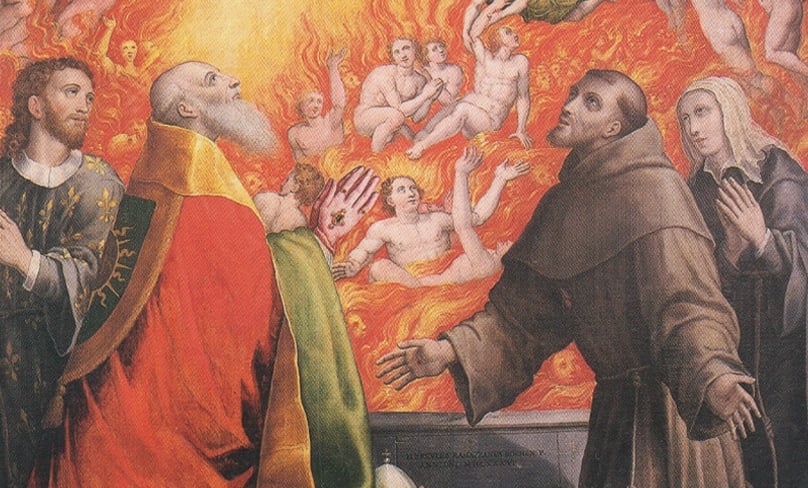
No one is actually dead. When a person’s body stops working, they go on living.
I was made painfully aware of this six years ago when I had a near-death experience from a stroke. I could feel my body and soul coming apart.
Spoiler alert: they got back together again (thank you God). But it was very clear that the bit of me that was really “me”—my immortal soul—would continue to exist after my body had given up.
My parents are still alive, even though I can assure you that I saw them leave the premises. My nephew is still alive, even though he took his own life in August this year.
If you’re a Catholic, that’s what all of us believe, and it’s well-rooted in Scripture and clearly described in the very earliest church. The “dead” are still alive, and you should pray for them so that their sins are forgiven.
St Paul says we should know the truth about this so that we don’t mourn terribly for our loved ones, like pagans do (1 Thess 4:13).
Where I will see these people again is another matter. I’m hoping it’s a happy place. That’s up to God’s mercy and our life choices when we were all in our bodies.
I find that in November, the Holy Souls press in on me quite strongly. I’m glad, because some people in the church today are in danger of forgetting them—or worse, treating them like an embarrassing relic of their childhood.
I was surprised to find out that only around two-thirds of my Catholics in Australia survey participants, who were mostly good Sunday massgoers, believed in the existence of purgatory.
Most of them believed in heaven, of course, because heaven is lovely and we’re all keen to go there. But more of them believed in hell than in purgatory.
This baffled me. Why would you rather believe in hell than in purgatory?
I realised that it’s linked to the decline in the practice of confession as well. In my study, the less often a person went to confession, the less likely they were to believe in the existence of purgatory.
These both reflect the loss of a sense of sin. We’ve become a church where love means never having to say you’re sorry, either before or after death.
Our catechesis on sin generally—and the need for purification after death—is pretty lame.
You get a homily once a year on All Souls Day.
Catholic funerals are also now considered the wrong time to mention that perhaps not everyone dies radiant with angelic light and good deeds. Instead, we have a celebration of their life, a usually regrettable eulogy, and “Little Spanish Flea” as the recessional.
Of all the age groups in my survey, the Catholics least likely to believe in purgatory were aged 70 to 79 years. Just 40 per cent of them believed in it.
You would think that people in this age group—the eldest of the Boomers—would have something of a vested interest in purgatory. They’re statistically quite close to finding out about its existence first-hand.
But don’t panic, because 87 per cent of the 18 to 29-year-olds believed in the existence of purgatory. They’re going to have to do the heavy lifting in prayers and Masses when the 70 to 79-year-olds die.
Which diocese in Australia has the highest rate of people who believe in the existence of purgatory? Remember that I have to leave some dioceses out because less than 20 people responded.
The winner is Wagga Wagga with 91 per cent of survey participants, followed by Perth with 73 per cent. But there were also five rural dioceses where less than half of my participants believed in the existence of purgatory.
Thankfully, prayer for the Holy Souls is extremely efficient, in that you can pray for all of them at once. Or you can specialise; it’s up to you.
The Holy Souls are also fantastic friends to have. While there’s no formal church teaching on this, I can tell you that I’ve had many prayers answered when I’ve asked the Holy Souls to intercede for me.
It’s fine to celebrate their life and remember them fondly, but neither of these things really helps them if they’re still being purified. So pray for the dead, and have Masses said for them.
Teach your fellow Catholics to pray for the dead as well, because clearly this is something that’s slipping out of our catechesis.
